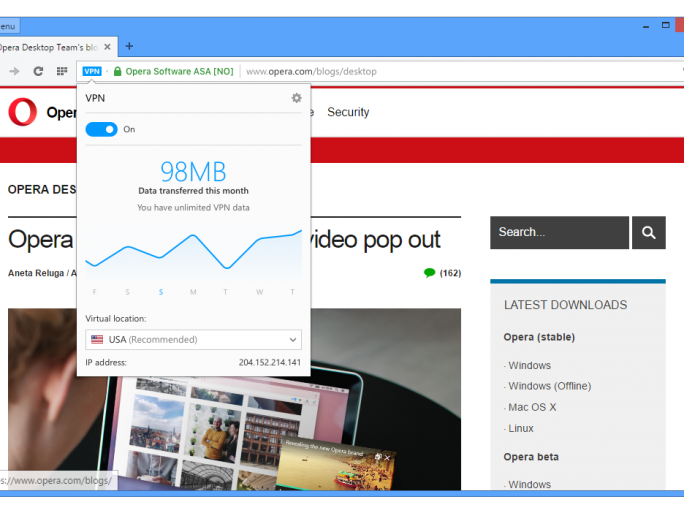Opera releases desktop browser with free built-in VPN


Norway’s Opera has released a web browser with a built-in virtual private network (VPN), offering free 256-bit encryption that can hide IP addresses and bypass firewalls.
The function, an optional tool on Opera 50, follows the acquisition of VPN service SurfEasy last March.
The built-in VPN effectively allows users to unblock firewalls, stop your browser session from leaking onto public WiFi networks, and make it more difficult for websites to track your location and identify your computer.
“Everyone deserves to be private online if they want to be. By adding a free, unlimited VPN directly into the browser, no additional download or extensions from an unknown third-party provider are necessary,” said Krystian Kolondra, SVP at Opera.
The release, which is still in developer phase, currently allows users to choose from one of three virtual locations – USA, Canada and Germany – but more locations will be available in the stable version of the browser, said Opera.
Opera said its VPN is unlike most other services, which are limited and based on a paid subscription.
“With a free, unlimited, native VPN that just works out-of-the-box and doesn’t require any subscription, Opera wants to make VPNs available to everyone,” said the company, which is currently in the midst of a $1.2bn takeover by Chinese investors.
To activate the VPN, Mac users need to click on the Opera menu, select Preferences, then toggle the VPN feature. Windows and Linux users need to head for Privacy and Security, then Setting, then enable the VPN there.
Ad blocking
In March, Opera became the first major PC web browser developer to include native ad blocking, claiming web pages can load up to 90 percent faster than without any tools activated.
The company says that because ad blocking is done at a web engine level, its tool is 40 percent faster than third party browser extensions on the likes of Chrome and Firefox.
Many use ad blockers because they find ads intrusive while others believe some creatives slow down system performance, use excessive amounts of data and reduce battery life, while others hold security fears. A number of advertising networks have been used to launch malvertising attacks in recent times.
Recent Posts
Flashpoint enters new chapter with global partner programme
Security vendor Flashpoint debuts partner programme following $28m funding
Channel partner “disconnect” hindering growth
Complex buying journeys and sprawling partner networks hampering customer experience, says Accenture
Cyxtera launches global channel partner programme
Datacentre provider Cyxtera says launch is “milestone in our go-to-market strategy”
US IT provider brings mainframe services to UK
Ensono highlights importance of mainframes still to major industries
VASCO and Nuvias expand distribution across EMEA
Security vendor VASCO looks to replicate UK and German set up across EMEA
Splunk says channel investments driving growth
Splunk details investment in Partner+ programme at .conf2017